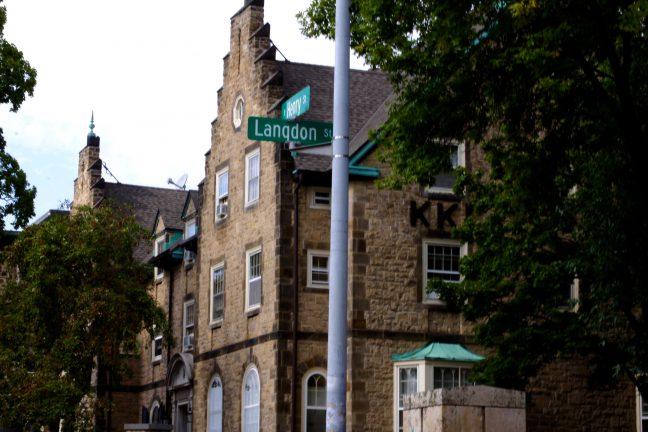The external review conducted on University of Wisconsin fraternity and sorority life was released recently, after being submitted mid-May.
The review, according to the Fraternity and Sorority Life website, was conducted with a goal for “students to be healthy and safe and for fraternities and sororities to contribute positively to the campus community through their shared values of scholarship, leadership, service and sisterhood/brotherhood.”
The review was conducted by five professionals from other universities, each holding membership in an organization that is part of the four governing Greek councils (Interfraternity Council, Multicultural Greek Council, National Panhellenic Council and Panhellenic Association).
The report discussed accountability and relationships with UW.
The report stated that concerns about behaviors and how to manage accountability for them varied by Council. While accountability was not brought up as a critical issue during conversations with members of the NPHC and MGC, that did not hold true for all councils.
IFC and Panhellenic council members, according to the report, didn’t address using their own judicial or standards boards to resolve infractions committed by their members.
While IFC has a Judicial Board, the report stated that “its function was unclear.” A Panhellenic Council Judicial Board was brought up, but the report stated that no conversation was directed in verifying whether this was an operational or effective tool or deterrent.
The Committee on Student Organizations, according to the report, brought on almost universal negative connotations. Chapter members, student officers and alumnus advisers complained that CSO had a lack of transparency, a process that appeared to apply differently to Greek life organizations versus other student organizations, sanctions that were not deemed fitting to the violation and confusion over what role different staff members played in the process.
The report stated that “students feel that they cannot ask clarifying questions about policy because in doing so they might raise suspicion of a staff member and will then be scrutinized in the future.” It went on to state that students would thrive best in environments that promoted open dialogues about different situations and their consequences if that becomes relevant.
The report added that the University of Wisconsin Police Department has a “poor, almost non-existent relationship with housed IFC/PHA chapters,” but stated that Madison Police fared better.
UWPD spokesperson Marc Lovicott said Langdon Street is not in the jurisdiction of UWPD, so it makes sense that MPD has a closer relationship with Greek life.
“We have a great relationship with MPD and we’re actually out on Langdon quite a bit as well even though it’s not technically our territory,” Lovicott said.
Students and alumni advisers cited Officer Damion Figueroa as having worked with students and Greek organizations in a positive way.
MPD Public Information Officer Joel DeSpain appeared unsurprised to hear that Figueroa was popular with students.
“Officer Figueroa really enjoys the work: he loves talking to students and meeting new people,” DeSpain said. “We feel he has done a good job and we’re happy to hear students feel the same. The benchmarks of our department are community-based and trust-based, and to establish relationships with the students is really important.”
DeSpain said the purpose of having officers who take on certain areas or streets is to help facilitate relationship building.
He added that these good relationships promote good communication, which he said is key in MPD doing their jobs.
“We can’t do it on our own,” DeSpain said. “All those good people who live on Langdon [Street], they need to communicate quickly with us so we can take care of things if the need arises.”
Students from certain councils also stated that they felt marginalized: some explained a perceived pattern that when IFC/PHA Greek students did “something bad,” all Greeks faced blame or potential consequence. However, when MGC/NPHC Greek students “[did] good,” it didn’t receive any recognition.
The students added that this treatment discrepancy heightened the marginalization they already felt: a student of color said that generally, students of color can be left “feeling that they are not being supported.”
The report detailed that some NPHC Chapter Advisors said, and was corroborated by staff members that “students of color figuring things out on their own” was a commonplace occurrence in the community.
Regarding drinking, the report said that while UW has a well-researched aggregate of data on “alcohol issues” in the community, that data didn’t appear to be being used in creating effective intervention strategies.
The report was also very firm about UW’s involvement in curbing sexual assault issues in Greek life.
“. . . The institution must do more to create a safer environments for students,” the report said. “The institution cannot put its head in the sand concerning proactive, prevention risk management issues, and then hold students accountable when things go wrong.”
The report added alumni and students suggested they wanted help from the institution, so collaboration would likely be effective.
The report said that across all councils, students said they were grateful for their Greek experience.
Thomas Gillis, a sophomore at UW who was a member of Delta Chi Fraternity’s Fall 2018 rush class, said being in a fraternity has been positive for him. It has given him a sense of community and helped him look for ways to do more.
“Being in a [fraternity] has changed me in a way I didn’t expect,” Gillis said. “It’s not that I’m more outgoing, but it’s made me seek out opportunities and go for them. I act on things now, and before I was more of a spectator. It really does give you a feeling that you belong to something, that what you do is important, that what you do can affect a group as a whole, a group that you care about.”
Sept. 18, 5:21 p.m.: This article has been updated to include a statement from UWPD.


